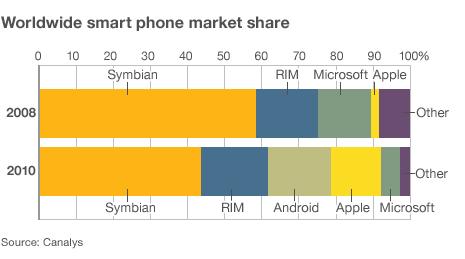Microsoft launches Windows Phone 7 smartphones
- Published
Microsoft's Ashley Highfield shows Rory Cellan-Jones the mobile operating system's features.
Microsoft has launched Windows Phone 7, its latest attempt to break into the lucrative smartphone market.
Until now the company has failed to provide a credible challenge to rival operating systems from Apple, Google, Research in Motion and Nokia.
Mobile phone operators predict smartphones will have a 70% market share in just three years.
Microsoft says it has made Windows Phone 7 more user-friendly, rebuilding the operating system from bottom up.
The phone system's experience is built around so-called hubs that aggregate content like contacts, pictures, documents, and music and video. The content on the phone is then synchronised both with storage services on the internet and the owner's computers at home.
At launch Microsoft's new phone system will be available on nine phones, and with 60 operators in 30 countries.
In the UK the phone will launch on 21 October, while the US launch will be in early November.
Fry approval
Stephen Fry, the UK actor, well-known Apple fan and smartphone buff, made a surprise appearance at Microsoft's UK launch of Windows Phone 7, where he described the new operating system as a "joy to play with".
Previous mobile operating systems from Microsoft have failed to make an impact with customers; their limited functionality, fiddly user interface and lack of applications to customise the phones had resulted in a steady loss of market share.
The new mobile phone software is indeed startlingly different from Microsoft's previous attempts. This is probably most highlighted by the disappearance of the menu button; the company's old "Windows Mobile" software was notorious for leading users into increasingly technical sub menus to execute even simple tasks.
Using the new software has a much more natural flow to it, although some key functions - like "cut and paste" - are missing, but promised to arrive as a software update in early 2011.
Andy Lees, the man in charge of Microsoft's mobile phone division, called the system "a new beginning", with his team building a new operating system and user interface in just 18 months.
Taking a dig at rivals like Apple and Google's Android, he told the BBC that Windows Phone 7 was neither a "closed system" nor an anything goes system, with the operating system providing a structure and coherent user interface for partners to build on.
Mr Lees said he could not say for sure how many applications would be available when Windows Phone 7 hits the market, because so many were still in the pipeline for approval.
However, key apps like Twitter, Facebook, eBay and railway timetables have been fast-tracked to be ready for launch.

Nearly half of all apps would be for gaming said Mr Lees, and he announced that videogame giant Electronic Arts was a launch partner for the new phones.
Rivals
While Nokia's Symbian operating system is still the smartphone market leader, Apple has rapidly gained market share with its iPhones, while phones using Google's Android software are forecast to overtake Apple soon.
Research in Motion, meanwhile, has seen its Blackberry phones gain popularity beyond its stronghold of business users.
"There's a huge amount resting on the launch of Windows Phone 7 for Microsoft, its device and operator partners, and for the ecosystem market in general," said Tony Cripps of technology consultants Ovum.
"If it fails to claw back market share lost to iPhone and Android, then Windows Phone 7 may well mark the point at which Microsoft turns its back on smartphones forever."
Consumer success
Microsoft is pitching the phone firmly at consumers, integrating it with its popular XBox live service for video games, and the much less popular Zune music service.
Xbox live currently has 23 million subscribers, and Microsoft hopes that a seamless integration will entice them to take their Xbox Live world into the mobile space.
The Zune music subscription service is currently being rolled out in dozens of markets, and will be available in the UK from the end of October.
In the UK seven of the new phones will be launched on 21 October, while the US line-up will include nine phones that will hit the market in November.
The software will be launched with established partners like HTC, Samsung and LG - three phones makers who have experience building phones for the Windows mobile platform. Another launch partner is computer maker Dell.
Crucial for Microsoft's success will be whether the new phone software manages to surpass rivals in terms of usability.
Ovum's Tony Cripps says the operating system shows promise: "On the face of it Windows Phone 7 looks to have positioned Microsoft on the edge of a smartphone renaissance.
"Its all-important user experience looks to have brought some genuinely new thinking to a smartphone market in which all operating systems feel somewhat similar in use."
In the US the Windows phones will first launch on the AT&T and T-Mobile networks, while around the world Microsoft has signed up partners like Telefonica, Orange, T-Mobile, Vodafone and SingTel.
Microsoft hopes to build on the recent success of its Windows 7 operating system for desktop computers, the revamped search engine Bing, and the broadly positive review for its new browser, Internet Explorer 9.
However, Mr Lees said that Microsoft had no plans to launch a Windows Phone 7 tablet computer. Instead, Microsoft would roll out Windows 7 for tablets to provide a full computing experience.
- Published16 July 2010